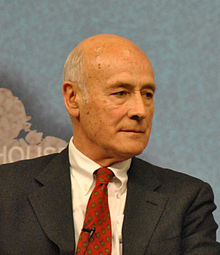Joseph Nye
| Joseph Nye | |
|---|---|
 |
|
| Assistant Secretary of Defense for International Security Affairs | |
|
In office September 15, 1994 – December 16, 1995 |
|
| President | Bill Clinton |
| Preceded by | Chas Freeman |
| Succeeded by | Franklin Kramer |
| Chair of the National Intelligence Council | |
|
In office February 20, 1993 – September 15, 1994 |
|
| President | Bill Clinton |
| Preceded by | Fritz Ermarth |
| Succeeded by | Christine Williams |
| Personal details | |
| Born |
Joseph Samuel Nye, Jr. January 19, 1937 South Orange, New Jersey, U.S. |
| Education |
Princeton University (BA) Exeter College, Oxford (MA) Harvard University (PhD) |
Joseph Samuel Nye, Jr. (born January 19, 1937) is an American political scientist. He is the co-founder, along with Robert Keohane, of the international relations theory of neoliberalism, developed in their 1977 book Power and Interdependence. Together with Keohane, he developed the concepts of asymmetrical and complex interdependence. They also explored transnational relations and world politics in an edited volume in the 1970s. More recently, he pioneered the theory of soft power. His notion of "smart power" became popular with the use of this phrase by members of the Clinton Administration, and more recently the Obama Administration. He is the former Dean of the John F. Kennedy School of Government at Harvard University where he currently holds the position of University Distinguished Service Professor. He has been a member of the faculty since 1964. He is a fellow of the American Academy of Arts & Sciences and a foreign fellow of The British Academy. Nye is also a member of the American Academy of Diplomacy.
The 2011 TRIP survey of over 1700 international relations scholars ranks Joe Nye as the sixth most influential scholar in the field of international relations in the past twenty years. He was also ranked as most influential in American foreign policy.
In 2011, Foreign Policy magazine named him to its list of top global thinkers. The magazine's valued reporter Daniel Drezner wrote: "All roads to understanding American foreign policy run through Joe Nye."
In September 2014, Foreign Policy reported that the international relations scholars and policymakers both ranked Nye as one of the most influential scholars.
...
Wikipedia
